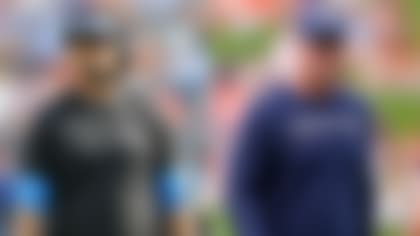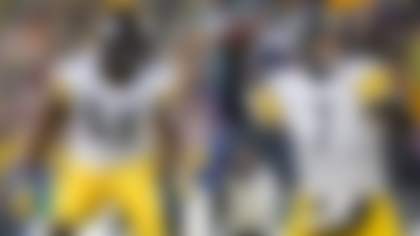The Atlanta Falcons (2-0) opened up their new building with a bang, getting out early on the ailing Green Bay Packers (1-1) and then holding them off late to secure a 34-23 victory in Week 2. Here's what we learned:
- Green Bay was bit by the injury bug before and during Sunday night's loss. Starting tackles Bryan Bulaga and David Bakhtiari were both inactive, thrusting Kyle Murphy and Justin McCray into the unenviable positions of blocking Vic Beasley and De'Vondre Campbell. For a quarter or so, the backups stood firm. But as the game wore, the pocket collapsed, forcing Rodgers to improvise from outside the hashes and behind on the scoreboard. Beasley's game-sealing strip-sack, if you could call it that, was the direct result of five failed cut blocks along the offensive line and was the defining image of a night marred by injuries and miscommunication along the Green Bay front.
Adding injury to injury, the Packers lost their two most indispensable players on both sides of the ball, Mike Daniels and Jordy Nelson, in the first quarter to respective hamstring and quad injuries, changing Green Bay's game plan out of the gate. If these injuries are long-term deals, the Packers will be in deep trouble.
It's a shame we didn't get to see these two NFC behemoths go 60 minutes at full strength; maybe if the scheduling gods had moved this test farther back in the league calendar, this wouldn't have been an issue. But something tells us we'll be seeing these foes again down the line ...
- The backs are back. After Devonta Freeman and Tevin Coleman combined for just 52 rushing yards in Week 1, the Falcons' dynamic duo fell right back into 2016 form, rushing for 126 combined yards and two scores. Maybe it was the speedy home turf, or maybe it was the absence of the aforementioned Daniels. But for those wondering if the Steve Sarkisian-coached Falcons would somehow deviate from the successful back-centric formula that took Atlanta to the Super Bowl, think again.
- Kevin King proved to be a welcome addition to Green Bay's beleaguered secondary, closing in on tackles and shadowing Julio Jones occasionally. But the rookie cornerback wasn't enough to contain the Falcons' unstoppable wideout whose lateral speed gave the Packers secondary fits once again. Julio set the tone early with four catches of 10-plus yards, all in the first half. Green Bay fans would be forgiven for suffering serious deja vu from the NFC Championship game, when Jones burned the Pack for 180 yards on nine catches. But it's hard to blame Dom Capers' unit; there are few, if any, defensive back groupings in the nation who can slow Jones to a halt.
- Atlanta had to deal with its fair share of injuries as well. Beasley exited with a hamstring injury in the second half, but the affliction that could have derailed the Falcons' evening came on the offensive line when starting right tackle Ryan Schraeder was sidelined with a concussion in the first quarter. Broncos castoff Ty Sambrailo stepped in and, save for one Clay Matthews stunt sack, protected Matt Ryan well. Sometimes a liability in Denver, Sambrailo passed his first test in the Peach State.
- After taking an absolute shellacking from Atlanta's hard-hitting defense on Sunday night, Rodgers has to reconsider how frequently he ad-libs and holds onto the ball, especially now that he's working behind a hampered offensive line. The Packers quarterback took bone-rattling hits from Beasley, rookie Takkarist McKinley and Adrian Clayborn, those hits that make you want to suffocate your starter in bubble wrap until the coast is clear.
- The Packers obviously hope that Nelson isn't out for an extended period of time with this quad injury, but they should be fine with Davante Adams as their X receiver. The fourth-year wideout had another stellar evening, hauling in eight balls on 10 targets for 99 yards and one highlight-reel touchdown.
- Mike McCarthy should probably practice his pick plays this week. Green Bay lost 11 points partially due to pass interference calls on botched pick plays at the end of the first and start of the second half. The final score differential? You can do the math.












